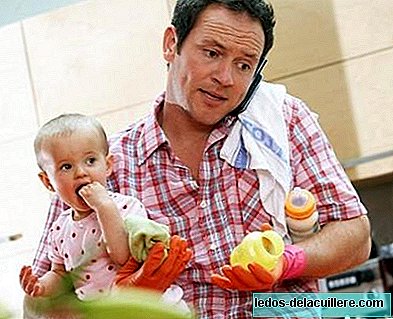The feeding of children during their first years of life will be what will define much of their development, so it is important to instill good eating habits from childhood. However, many times as parents we do not realize that what our children consume is not the best for them.
This is the case of some parents in the United States, as one study found that most children under two years of age consume too much added sugar.
What are added sugars?
When we talk about added sugars, we mean those who, unlike natural sugars, they are not typical of a food, but are added during the processing of the food. Some examples of this are processed or ultraprocessed foods, such as goodies and soft drinks.
The types of foods that contain added sugars usually have little or no nutritional value, do not provide satiety and increase the risk of disease like overweight, obesity, diabetes or cancer.
The study
Presented at the annual meeting of the American Society for Nutrition held in Boston, United States between June 9 and 12 and published on its website, this new study analyzed the consumption of added sugars in American children aged between 6 and 23 months.
Using data from a survey conducted between 2011 and 2014, the researchers reviewed the prevalence and average consumption of added sugars in 806 babies and children that were in the aforementioned age range.
They found that 85% of them consumed added sugars on a normal day, and the percentage of babies and children who consume added sugars divided by group was as follows:
- 61% of babies whose ages were between 6 and 11 months.
- 98% of children between 12 and 18 months consumed them.
- 99% of children between 19 and 23 months consumed them.
Although the percentages are high, they are not very surprising, since most of the products we find in supermarkets contain hidden added sugars. However, what alarmed the researchers is the amount of added sugars consumed by babies and children a day:
- The average among all children aged 6 to 23 months was 4.2 tablespoons.
- Babies 6 to 11 months consumed 0.9 tablespoons a day.
- Children 12 to 18 months consumed 5.5 tablespoons a day.
- Children from 19 to 23 months consumed 7.1 tablespoons a day.
These amounts far exceed the recommendation of the World Health Organization, as The daily intake of sugar in children aged 1 to 3 years should be a maximum of about 17 grams of sugar per day, which is roughly equivalent to a level scoop.
How to avoid or reduce the consumption of added sugars
While this study speaks only of children under two years of age in the United States, products containing added sugars are everywhere and many of them are aimed at children, so regardless of whether we live in the United States, Spain or anywhere, we must pay attention to this problem.
The reality is that making a purchase without added sugars is almost an impossible mission because they are hidden in many products that we find in supermarkets, and it is more expensive to buy food that does not contain them.
However, we can gradually eliminate them from our diet, and for this it is important to learn to read the labels to identify and eliminate them from our shopping list, and thus opt for healthier foods that contain less or no added sugar.
Another option is choose natural foods: Instead of buying juices, offer fresh fruit, which contains only natural sugars and establish natural or tasteless water as the main drink for all meals. We may not be able to eliminate all products or foods that have added sugars, but we can avoid most or choose those that have them in less quantity.












